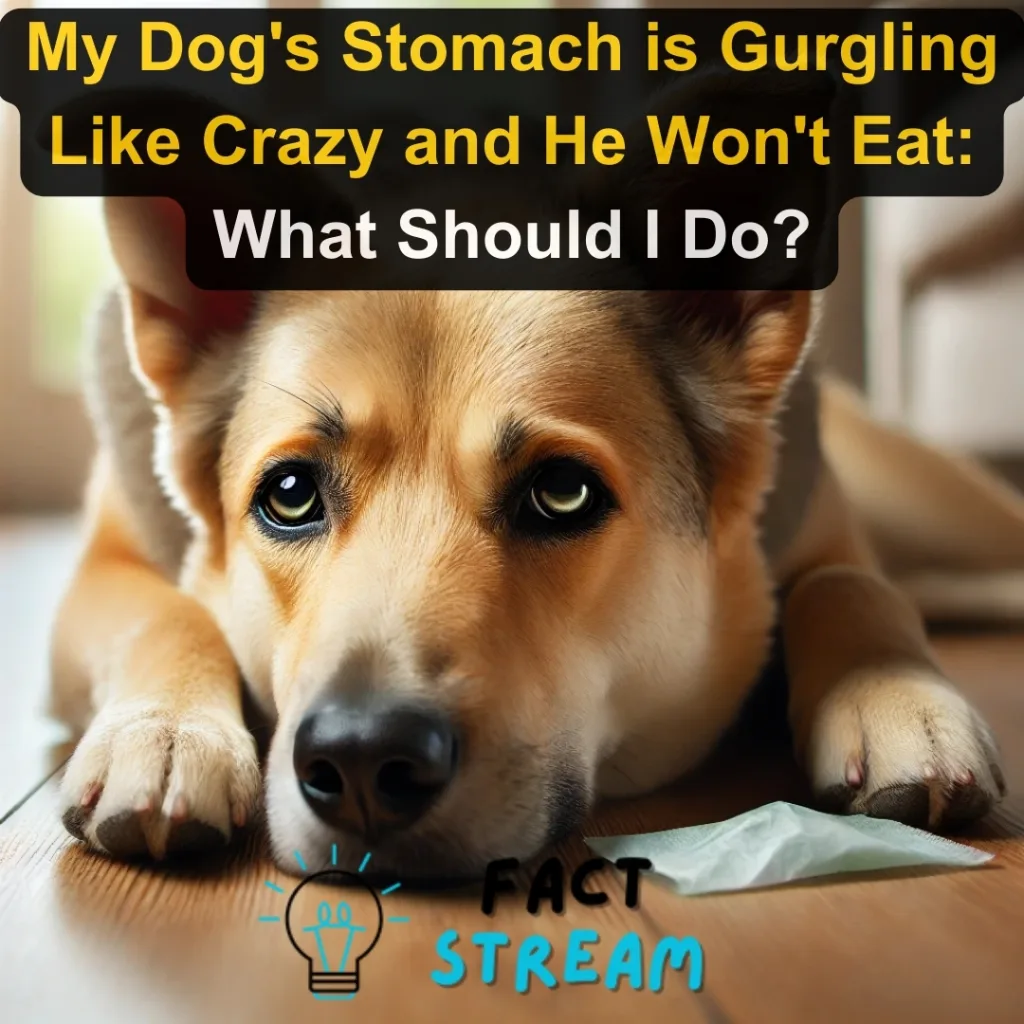My Dog’s Stomach is Gurgling Like Crazy and He Won’t Eat: What Should I Do?
As a loving dog owner, it can be alarming to hear your dog’s stomach gurgling excessively, especially when they refuse to eat. While occasional stomach noises are normal, a combination of loud gurgling and appetite loss could signal an underlying issue. This article will guide you through possible causes, home remedies, and when to seek veterinary care.
Understanding Dog Stomach Noises
Stomach gurgling, medically known as borborygmi, occurs when gas moves through the intestines. It’s often a normal part of digestion, much like our own stomach rumbling. However, the intensity and frequency of these sounds, along with other symptoms, can help determine if there’s a cause for concern.
Common Causes of Stomach Gurgling and Loss of Appetite
Here are some common reasons why your dog’s stomach may be making noises and why they might not be eating:
- Hunger: An empty stomach and intestines can amplify the sounds of digestion, leading to noticeable gurgling. This is usually accompanied by eagerness to eat and quickly resolves with a meal.
- Eating Too Quickly: When dogs gulp down their food, they swallow air, causing aerophagia. This excess air contributes to gas and gurgling.
- Dietary Indiscretion: Eating something unusual, spoiled, or disagreeable can upset your dog’s stomach, resulting in gurgling, gas, vomiting, or diarrhea.
- Stress and Anxiety: Stress can disrupt a dog’s digestive system, leading to gurgling, appetite loss, and even vomiting. Changes in routine, loud noises, or new environments can trigger anxiety in dogs.
When to Worry: Red Flags
If your dog’s stomach gurgling is persistent and accompanied by any of these symptoms, it’s crucial to consult your veterinarian:
- Vomiting: Especially if it’s frequent or forceful.
- Diarrhea: Particularly if it lasts more than 24-48 hours, contains blood, or is accompanied by other symptoms.
- Lethargy: A significant decrease in energy levels.
- Loss of Appetite: Prolonged refusal to eat, especially if accompanied by weight loss.
- Hunched Posture or Signs of Pain: This can indicate abdominal discomfort.
Potential Serious Conditions
While most cases of stomach gurgling are benign, persistent issues accompanied by the above red flags could indicate more serious conditions:
- Parasites: Intestinal worms like roundworms and hookworms can cause digestive upset, including gurgling, diarrhea, and vomiting.
- Inflammatory Bowel Disease (IBD): Chronic inflammation of the digestive tract can cause various symptoms, including gurgling, vomiting, diarrhea, and weight loss.
- Pancreatitis: Inflammation of the pancreas can lead to severe abdominal pain, vomiting, and loss of appetite.
- Gastrointestinal Obstruction: A blockage in the stomach or intestines, often caused by swallowing foreign objects, is a surgical emergency.
Home Remedies for Mild Stomach Upset
If your dog’s stomach gurgling is mild and not accompanied by other concerning symptoms, you can try these home remedies:
- Fasting: Withhold food for 12 hours to allow the stomach to settle.
- Bland Diet: After fasting, offer small, frequent meals of boiled chicken and rice.
- Fresh Water: Ensure constant access to fresh water to aid digestion and prevent dehydration.
- Slow-Feeder Bowl: This encourages slower eating and reduces air swallowing.
- Probiotics: These can help restore a healthy balance of gut bacteria.
- Calming Aids: If stress is a factor, calming treats or pheromone diffusers can help.
Seeking Veterinary Care
Always err on the side of caution. If your dog’s stomach gurgling persists or worsens, or if you notice any of the red flags mentioned, consult your veterinarian immediately.
Your veterinarian will perform a physical exam and may recommend diagnostic tests like bloodwork, urinalysis, fecal exams, X-rays, or ultrasounds to determine the underlying cause. Based on the diagnosis, they will recommend the appropriate treatment plan.
Proactive Measures
Here are some ways to prevent future episodes of stomach upset:
- Feed High-Quality Food: Choose a diet appropriate for your dog’s age, breed, and activity level.
- Establish a Regular Feeding Schedule: Avoid free-feeding to prevent overeating and digestive issues.
- Monitor for Dietary Sensitivities: Pay attention to any food or treats that seem to trigger digestive upset.
- Manage Stress: Provide a safe and stable environment for your dog and address any anxiety issues.
Remember: You know your dog best. If you’re concerned about their health, don’t hesitate to seek professional advice. With proper care and attention, you can help your furry friend feel better soon!


